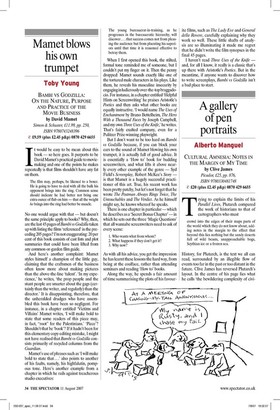Mamet blows his own trumpet BAMBI VS GODZILLA: ON THE
NATURE, PURPOSE AND PRACTICE OF THE MOVIE BUSINESS by David Mamet Simon & Schuster, £11.99, pp. 250, ISBN 9780743248396 © £9.59 (plus £2.45 p&p) 0870 429 6655 1 t would be easy to be mean about this book — so here goes. It purports to be David Mamet's practical guide to moviemaking and one of the points he makes repeatedly is that films shouldn't have any fat on them.
The film may, perhaps, be likened to a boxer. He is going to have to deal with all the bulk his opponent brings into the ring. Common sense should indicate he had better not bring one extra ounce of flab on him — that all the weight he brings into the ring had better be muscle.
No one would argue with that — but doesn't the same principle apply to books? Why, then, are the last 45 pages of Bambi vs Godzilla taken up with listing the films 'referenced' in the preceding 205 pages? I'm not exaggerating: 20 per cent of this book consists of cast lists and plot summaries that could have been lifted from any common-or-garden film guide.
And here's another complaint: Mamet styles himself a champion of the little guy, claiming that the craftsmen of the business often know more about making pictures than the above-the-line `talent'. 'In my experience,' he writes, `the prop people and the stunt people are smarter about the gags (certainly than the writer, and regularly) than the director.' It is disappointing, therefore, that the unheralded drudges who have assembled this book have been so negligent. For instance, in a chapter entitled 'Victims and Villains' Mamet writes, 'I will make bold to state that some readers of this piece may, in fact, "root" for the Palestinians."Piece'? Shouldn't that be 'book'? If it hadn't been for this elementary copy-editing mistake, I might not have realised that Bambi vs Godzilla consists primarily of recycled columns from the Guardian.
Mamet's use of phrases such as 'I will make bold to state that ...' also points to another of his faults, namely, his highfalutin, pompous tone. Here's another example from a chapter in which he rails against treacherous studio executives: The young bureaucrat-in-training, as he progresses in the bureaucratic hierarchy, will discover. ... that success comes not from pleasing the audience but from placating his superiors until that time it is reasoned effective to betray them.
When I first opened this book, the stilted, formal tone reminded me of someone, but I couldn't put my finger on it. Then the penny dropped: Mamet sounds exactly like one of the tortured male characters in his plays. Like them, he reveals his masculine insecurity by engaging in ludicrously over-the-top braggadocio. For instance, in a chapter entitled 'Helpful Hints on Screenwriting' he praises Aristotle's Poetics and then asks what other books are equally instructive. 'I would name The Uses of Enchantment by Bruno Bettelheim, The Hero With a Thousand Faces by Joseph Campbell, and my own Three Uses of the Knife,' he writes. That's fairly exalted company, even for a Pulitzer Prize-winning playwright.
But I don't want to be too hard on Bambi vs Godzilla because, if you can block your ears to the sound of Mamet blowing his own trumpet, it is actually full of good advice. It is essentially a 'How to' book for budding screenwriters, and what lifts it above nearly every other example of the genre — Syd Field's Screenplay, Robert McKee's Story — is that Mamet is a hugely successful practitioner of this art. True, his recent work has been pretty patchy, but let's not forget that he wrote The Postman Always Rings Twice, The Untouchables and The Verdict. As he himself might say, he knows whereof he speaks.
There is one chapter in particular — which he describes as a 'Secret Bonus Chapter' — in which he sets out the three 'Magic Questions' that all wannabe screenwriters need to ask of every scene: 1. Who wants what from whom?
2. What happens if they don't get it?
3. Why now?
As with all his advice, you get the impression he has learnt these lessons the hard way, from being at the coalface, rather than attending seminars and reading 'How to' books.
Along the way, he spends a fair amount of time summarising the plots of his favour ite films, such as The Lady Eve and General della Rovere, carefully explaining why they work so well. These little shafts of analysis are so illuminating it made me regret that he didn't write the film synopses in the final 45 pages.
I haven't read Three Uses of the Knife — and, for all I know, it really is a classic that's up there with Aristotle's Poetics. But in the meantime, if anyone wants to discover how to write screenplays, Bambi vs Godzilla isn't a bad place to start.









































 Previous page
Previous page